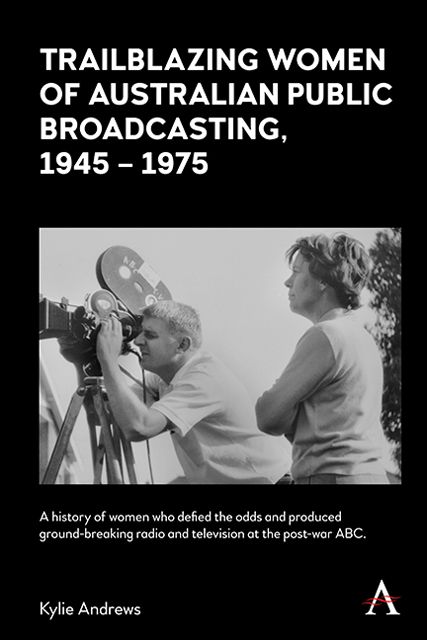Book contents
- Frontmatter
- Dedication
- Contents
- List of Figures
- List of Abbreviations
- Preface
- 1 Introduction
- 2 Career Snapshots
- 3 Welcome to the ABC, Ladies
- 4 The New Nation-Builders
- 5 Talent Was Not Enough
- 6 Thinking Outside the Box
- 7 Timely Escapes and Bittersweet Homecomings
- 8 International Adventures and Global Networking
- 9 Farewell to the ABC
- 10 Epilogue
- Reference List
- Index
8 - International Adventures and Global Networking
Published online by Cambridge University Press: 09 December 2022
- Frontmatter
- Dedication
- Contents
- List of Figures
- List of Abbreviations
- Preface
- 1 Introduction
- 2 Career Snapshots
- 3 Welcome to the ABC, Ladies
- 4 The New Nation-Builders
- 5 Talent Was Not Enough
- 6 Thinking Outside the Box
- 7 Timely Escapes and Bittersweet Homecomings
- 8 International Adventures and Global Networking
- 9 Farewell to the ABC
- 10 Epilogue
- Reference List
- Index
Summary
Kay Kinane, Catherine King, Therése Denny and Joyce Belfrage all underwent profound professional transformations when they trained, worked and networked overseas. Their international experiences played a key role in their ability to challenge male-centric hierarchies and infiltrate content domains fortified against women. By diving into broadcasting's transnational channels, they gained access to alliances and opportunities previously unavailable to them, assets which helped them compete as equals, and even as superiors, to their locally based male peers.
When Kay, Catherine, Therése and Joyce became active members of the global community of public broadcasters they were endowed with an authority and respectability that nourished their professional and political agendas; doors were opened, trust was given and their confidence grew. They took part in industry scholarships and producers’ exchanges and formed collegial, supportive relationships with like-minded media practitioners. They immersed themselves in new production environments and gained greater insights into their own industrial cultures. The producers also took advantage of the imbalanced power dynamics between broadcasting nations and absorbed the identities and characteristics of stronger production environments. With their new connections and knowledge, their status and value in the eyes of the ABC was subsequently magnified; they wielded these new skillsets back in Australia, at times with a ruthless purpose.
According to ABC producer and programme officer Mungo MacCallum, early prime-time television – both commercial and public – was a highly contested field; it was a ‘male-ordered world’ that worked to exclude capable and talented women. In his 1965 Nation article, MacCallum praised the few female practitioners who managed to write, produce and compère sessions aimed at male viewers. Women such as Jean Battersby, Corinne Kirby, Ann Deveson, Suzanne Baker and Therése Denny. These ambitious producers, he said, were a ‘band of sisters’, united in their professional ambitions and more than capable of disproving the stereotype of female broadcasters being ill-suited to ‘serious’ programming. MacCallum was aggrieved that so many ambitious women found it necessary to seek a remedy overseas. He blamed the dominant cultural identity at the time, that of the white male: ‘the fact is, though they may love or need them, Australian men don't like women’.
- Type
- Chapter
- Information
- Trailblazing Women of Australian Public Broadcasting, 1945-1975 , pp. 147 - 188Publisher: Anthem PressPrint publication year: 2022

